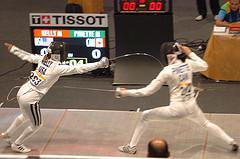 Athletes face different types of adversity when they’re traveling, especially for long periods of time. We’ve discussed health-related conditions such as DVT and Jet Lag, and preventative considerations such as which foods are best to eat while flying. Another major area of concern is nutrition. Athletes traveling to a game, match or event need to be in their best physical shape and especially conscientious about meeting carbohydrate, protein, vitamin and mineral requirements, balancing energy intake, maintaining adequate hydration, and making sure food is prepared and stored safely.
Athletes face different types of adversity when they’re traveling, especially for long periods of time. We’ve discussed health-related conditions such as DVT and Jet Lag, and preventative considerations such as which foods are best to eat while flying. Another major area of concern is nutrition. Athletes traveling to a game, match or event need to be in their best physical shape and especially conscientious about meeting carbohydrate, protein, vitamin and mineral requirements, balancing energy intake, maintaining adequate hydration, and making sure food is prepared and stored safely.
Dining out
The best way to meet these requirements is to plan out the whens, wheres and whats regarding your meals. Your plan should be as close to your regular (at home) diet as possible. Choose restaurants that provide options that will help fuel your health, energy, and performance. Places known for their pasta or lean meats (great sources of carbohydrates and protein) are good places to eat; stay away from deep fried dishes. Restaurants with a buffet option are usually great places for team meals as they provide a large variety of good foods for the athletes like pasta, lean meats, salads, rice, fish, chicken, and plenty of vegetables.
Snacks appropriate for Athletes
While on the road, the snacks you are used to picking up at your local convenience store may not be easy to find. Because they are important for recovery periods after training and between meals, make sure to bring some with you. Some snacks worth packing are cereal, cereal bars, canned fruits, dried fruit, peanut butter, jelly, powdered sports drinks or milk, concentrated fruit juice, and (if a microwave or stove is available) baked beans, spaghetti, or instant noodles.
Food Safety
Food safety is the biggest problem athletes can face when traveling in foreign countries. To avoid the risk of infection and illness in areas where the water is questionable, drink only bottled water or water from sealed containers, avoid ice in your drinks, use bottled water when brushing your teeth, avoid salad vegetables unless they are washed in bottled or boiling water, and only eat fruit if it can be peeled. If you’re in an area where the food quality is questionable, eat only from reputable hotels or well known franchises, avoid street stalls and markets, avoid fish and shellfish, only consume food that is steaming hot or has been adequately refrigerated. Also avoid sharing cups, bottles, and utensils.
Being prepared for your trip is the best way to ensure your own success both while traveling and competing.
Author: Derek Giannetti
Derek Giannetti, a guest contributor to the Healthy Travel blog, is an upcoming junior at Ursinus College where he plays football and studies Exercise and Sports Science. Upon graduation, Derek hopes to pursue a career in Health and Physical Education.
Photo by familymwr

